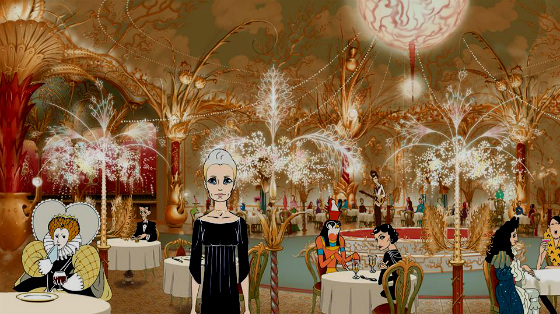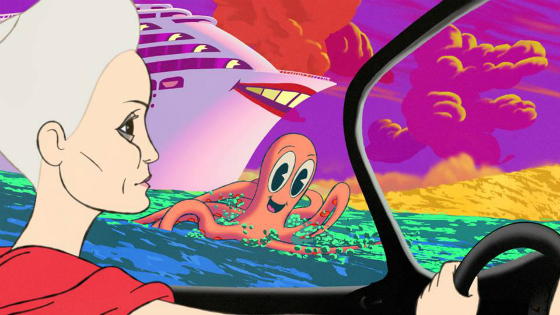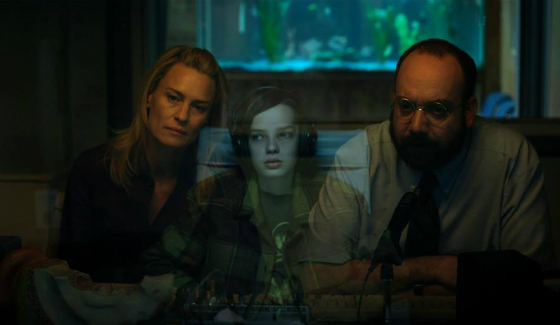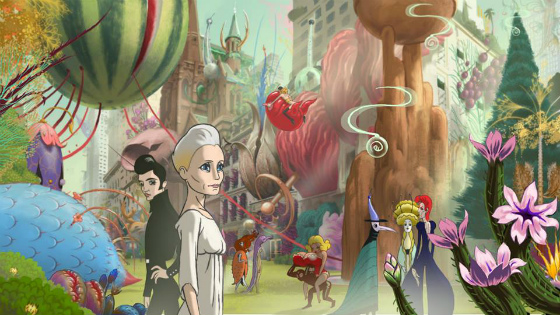AFI Fest 2013: Ex-Princess Bride Becomes a Weird-Ass Cartoon in The Congress (Review)
 |
I’m having a hard time coming to grips with The Congress – and maybe that’s the point, since it is a movie about perception versus reality. Can I complain that it doesn’t seem to know what it wants to be, when the whole point – or at least one of them – is that it’s about not knowing what you want to be, or indeed which reality you prefer to inhabit? Form could be following function, or it could actually be a less coherent film than I was hoping for. Or maybe both. Either way, I’m impressed with this live-action/animated hybrid, but not as engaged as I’d hoped, though I’m pretty sure it merits further contemplation.
 |
The Congress is divided into three distinct segments, each of which is tonally different from the others. The first, set in the present day, sees actress Robin Wright – as herself – deciding whether or not to sell her life rights to a movie studio, which will then manipulate an eternally young virtual version of her in any movie they wish, while she must agree never to act again. It’s rife with Hollywood in-jokes, but ends on a poignant note.
 |
The second, set 20 years in the future, sees Wright entering an “animated zone” wherein she becomes a cartoon scheduled to speak to the “Futurist Congress” and re-up her life-rights deal, which is about to expire. This part ranges from whimsical to nightmarish, sometimes within the same scene.
It would be spoiling to say too much about the third segment, which skips forward another 20 years, but it involves making the choice between the real and the animated.
 |
Those who’ve seen the animated segments in the trailer might be confused by how long it takes to kick in; at first, we’re just following Robin Wright, a single parent who lives in a remodeled hangar just outside LA airport. Daughter Sarah is a punky teen who has no qualms about talking back to mom about what roles she should take, while son Aaron (Kodi Smit-McPhee) is gradually losing his eyesight and hearing, and also seems to be at least a little bit Aspergers-y, obsessed with the Wright brothers and planes, and completely unable (or unwilling) to understand why security guards have a problem with his kite going over the fence into the airport.
During a medical exam – the inevitable motivation for Wright to make the big-money deal to sell her virtual image forever – Aaron’s doctor (Paul Giamatti) mentions that in the future, everything we see and hear will come from artificial mental stimuli, and Aaron is already on his way there. Meanwhile, in the present, as actors are phased out completely, the line between real and unreal in what we see is being ever more erased.
 |
When we see Wright many years later, she’s entering the animated world in a spectacular psychedelic sequence that’s like a mix of 2001‘s stargate with Roger Rabbit’s Toon Town. Live-action intrudes in the form of a film virtual Robin has made – it’s the real her (rather than a cartoon) and yet it isn’t (because it’s her manipulated, sold likeness). The animated world, which occasionally changes according to her mood, may be the true reality…albeit one in which she’s preparing to sell her very DNA so that people can literally drink her.
 |
But you can never trust your eyes – it could simply be that everyone here is on drugs to conceal the truth, like a version of the Matrix if it were designed by Ralph Bakshi and Max Fleischer. Many of the characters resemble living and dead celebrities, and while Tom Cruise sounds like Tom Cruise (it’s not him, just a good sound-alike), Ronald Reagan has a British accent. It’s no stretch to see this as a comment on what we the audience are seeing – the Robin Wright onscreen, though played by Robin Wright, is still a facsimile of Robin Wright the person. And when we get into the full-on Red King syndrome as to whose dream this truly is – there are ample clues from the getgo that it could be Aaron’s – well, the unmentioned but obvious option is “the audience’s.” There’s an early contract negotiation in which Wright insists that her avatar never do sci-fi, Holocaust movies, or porn – naturally, by the end of the movie, her animated form (the avatar as we the audience perceive it, but not the avatar within the story) has touched on all of them.
I love all of this in theory, and wish I didn’t have to point out that in practice, I wanted more non-meta story going on concurrent with the deeper stuff. I don’t need a ton of explosions, but I would like more of a propulsive narrative to take me through all the observations about the artifice of our perceptions, and the movies as false reality. Director Ari Folman won me over with Waltz With Bashir not just through its stunning visual style, but also because he began with a cliffhanger of not remembering what he did during the war, and as we went along, the pieces gradually fell into place just as they should. I feel like some pieces are missing from The Congress – it’s a jigsaw puzzle that’s fun to tinker with but I just can’t solve, in part because I can’t quite make out what the coherent picture at the end is supposed to be.
